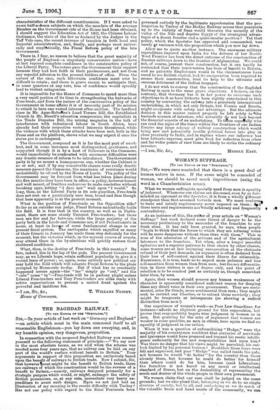THE BAGHDAD RAILWAY.
[To ran EDITOR OF TRI "SPIOTATOR."1 SIE,—In your article of last week on " Germany and England" —an article which must in the main commend itself to all reasonable Englishmen—you lay down one sweeping, and, in my humble opinion, very dangerous, proposition.
In connection with the proposed Baghdad Railway you commit yourself to the following statement of principle :—" We say now in the most absolute terms, as we said when the scheme was mooted some four years ago, that no railway can be laid on any part of the world's surface without benefit to Britain." Your arguments in support of this proposition are exclusively based upon the benefit of railways to British trade. Now I submit, Sir, that however treat might be the benefit to British trade, there are railways of which the construction would be the reverse of a benefit to Britain,—namely, railways designed primarily for a strategic purpose which would, or might, endanger the safety of British possessions, or, at any rate, necessitate very heavy ex- penditure to avert such danger. Htve we not just had an illustration of my meaning in the recent difficulty with Turkey? Has not our policy with regard to the Sinai' Peninsula been governed entirely by the legitimate apprehension that the pro- longation by Turkey of the Hedjaz Railway across that peninsula up to the vicinity of Sues would threaten the security of the valley of the Nile and deprive Egypt of the strategical advan- tages of a desert frontier and a quasi-insular position ? Yet that policy, which the Spectator has approved and commended, was surely it variance with the proposition which you now lay down.
Allow me to quote another instance. The enormous military expenditure imposed upon India for the defence of her North- West Frontier has been the direct outcome of the construction of Russian railways down to the frontier of Afghanistan. We could not, of course, prevent their construction, but it can hardly be contended that their construction has been of benefit to Britain, and no patriotic Englishman would in the circumstances have cared to see British capital, had its co-operation been required to secure their construction, lend its help to the ultimate and onerous detriment of the Indian taxpayer.
I do not wish to convey that the construction of the Baghdad Railway is open to the same grave objections. I believe, on the Contrary, that Germany has it in her power to overcome such objections to it as have hitherto been rightly entertained in this country by converting the railway into a genuinely international undertaking, in which not only Britain. but France and Russia, might co-operate with safety and advantage. But the ultimate decision in this matter cannot properly be left solely to othe busineis acumen of investors, who naturally olp not look beyond the financial aspects of an undertaking. To Mete espedlally who can read the signs of the times within the frontiers of our Indian Empire any large scheme of railway construction which would bring new and potentially hostile political forces into play in close proximity to India, and in regions where our influence has been hitherto supreme, must give food for reflection from other and far wider points of view than are likely to strike the ordinary investor.






































 Previous page
Previous page